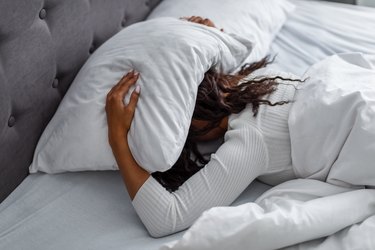
Most of us have experienced the headache and hangover effects after drinking too much alcohol — but it affects your body in other ways, too. Sometimes, drinking alcohol can cause your body to become swollen, especially your hands, feet or face. Here's why bloating happens and what to do about it.
Read more: Puffy and Swollen Hands Could Be Edema
Video of the Day
Video of the Day
Does Alcohol Make Swelling Worse?
Swelling or bloating can happen when there's too much fluid in your tissues. It's most common in your feet, lower legs, hands and, sometimes, your face. Swelling is often caused by sitting too long, eating too much salt or by certain health conditions (like congestive heart failure or liver or kidney disease), according to the Cleveland Clinic.
For some people, especially with these other health conditions, drinking alcohol can make swelling worse.
According to New York-based Janice Miles, CDN, RDN, a registered dietitian with the Creedmoor Addiction Treatment Center, drinking alcohol can cause your body to become swollen because of an electrolyte imbalance.
"Drinking large amounts of alcohol increases sodium levels, which causes you to retain more fluid," Miles says. "That excess sodium and fluid often accumulate in the tissues in your hands, feet and face."
If your drinking is accompanied by snacking or a meal, that might lead to even greater swelling in your extremities, along with alcohol-related face changes. Miles says the following high-sodium foods will likely make a puffy face or swollen hands after alcohol even worse:
- Pretzels
- Chips
- Pizza
Swelling and IBS
However, if your stomach bloats after drinking alcohol, it might not be from fluid, but from symptoms of irritable bowel syndrome (IBS) and changes in how quickly things move through your gut.
An August 2013 study in the American Journal of Gastroenterology found binge drinking (but not light drinking) was linked to worse IBS symptoms, including gas and bloating, in women.
In addition, an August 2016 study in Reviews on Recent Clinical Trials found alcohol can affect gastrointestinal motility, or the rate that things like food (and also gas) move through your intestines. Researchers determined occasional drinking can slow that movement, which might make gas and bloating more likely.
How Long Does Alcohol Bloating Last?
Mild bloating or fluid retention that's not caused by an underlying health problem is temporary and usually resolves on its own within a day or so, according to the Cleveland Clinic.
If bloating is due to digestive issues, such as irritable bowel syndrome, it may take more than three days for everything to move through your large intestine, according to a May 2019 review in BioPsychoSocial Medicine.
However, in someone with alcohol use disorder, severe swelling or bloating might be a sign of a more serious problem that needs medical attention. The U.S. National Library of Medicine (NLM) lists fluid buildup in the legs and abdomen as signs of alcohol-related liver disease. This can happen after years of heavy drinking.
Miles explains that this type of swelling in the abdomen is called ascites and happens as a result of severe liver damage, or cirrhosis. If you're experiencing ascites, it's important to stop drinking, eat a healthy, low-salt diet and talk to your health care provider about ways to protect your liver, according to the NLM.
Getting Rid of the Bloat
If you're wondering how to get rid of a puffy face from alcohol, the best thing to do is stop drinking and wait it out.
Miles also suggests eating a healthy diet with hydrating foods that are low in sodium and high in potassium to help restore electrolyte balance, such as:
- Fresh fruit
- Melons
- Grapes
- Peaches
- Pineapple
- Oranges
- Vegetables
- Cucumbers
- Tomatoes
- Leafy greens
- Carrots
- Herbal teas
- Herb- or fruit-infused water
- Fruit and vegetable smoothies
You can also use a pillow to elevate the part of your body that's swollen, like your head or feet, per the Cleveland Clinic. That helps shift the fluid out of the affected part of your body and might help you get rid of that puffy face or swollen feet left over from that night of drinking.
- Cleveland Clinic: “Edema”
- Janice Miles, CDN, RDN, registered dietitian, Creedmoor Addiction Treatment Center, Queens, New York
- American Journal of Gastroenterology: “Relationship Between Patterns of Alcohol Consumption and Gastrointestinal Symptoms Among Patients With Irritable Bowel Syndrome”
- Reviews on Recent Clinical Trials: “The Effect of Alcohol on Gastrointestinal Motility”
- BioPsychoSocial Medicine: “Specific Foods Can Reduce Symptoms of Irritable Bowel Syndrome and Functional Constipation: A Review”
- U.S. National Library of Medicine: “Alcoholic Liver Disease”
Is this an emergency? If you are experiencing serious medical symptoms, please see the National Library of Medicine’s list of signs you need emergency medical attention or call 911.